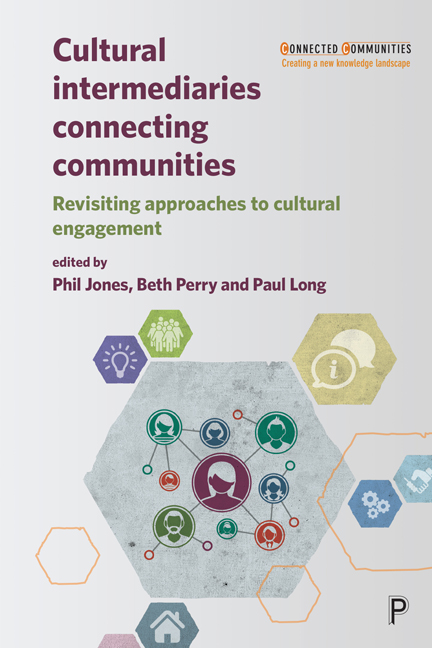Book contents
- Frontmatter
- Contents
- List of figures, tables and boxes
- Notes on contributors
- Acknowledgements
- Series editors’ foreword
- Introduction: Bringing communities and culture together
- Part One Changing contexts
- Part Two Practices of cultural intermediation
- Part Three Evaluation, impact and methodology
- Conclusion: where next for cultural intermediation?
- Index
eleven - Engineering cohesion: a reflection on academic practice in a community-based setting
Published online by Cambridge University Press: 30 April 2022
- Frontmatter
- Contents
- List of figures, tables and boxes
- Notes on contributors
- Acknowledgements
- Series editors’ foreword
- Introduction: Bringing communities and culture together
- Part One Changing contexts
- Part Two Practices of cultural intermediation
- Part Three Evaluation, impact and methodology
- Conclusion: where next for cultural intermediation?
- Index
Summary
Introduction
Debates around community cohesion in the UK have been prominent since the 2001 summer of riots in northern English towns. Following unrest on the streets of Bradford, Leeds and Oldham (Ouseley, 2001), the New Labour government was provided with impetus to address what was widely seen as a ‘lack of cohesion’ among distinct sets of urban communities. Perhaps predictably, the concern around the cohesion of communities in the UK was concentrated in poorer areas of the UK with high minority ethnic populations. The Cantle Report, Parallel lives (Cantle, 2001), suggested that a crisis of ethnic community separation, or even segregation, was under way in parts of the UK; a spate of policies followed from the New Labour government to enhance community cohesion. These largely centred on the deliberate emphasis of ‘shared values’ as an intrinsic component of policies designed to tackle a variety of social problems manifest within poorer inner-urban neighbourhoods of the city.
Critical discourse around these policies flourished (McGhee, 2003; Robinson, 2005; Ratcliffe, 2012). Community cohesion, with its inherently integrational approach, was – with some justification – seen to be emphasising the requirements of minorities to actively attach themselves to problematically intangible British norms and cultural practices. In parallel, however, the period of relative economic prosperity prior to 2008 also coincided with increasing social liberalism, and narratives of ‘diversity’ were promoted as a catalyst for and signifier of an open, inclusive type of Britishness. If the Cantle Report can be characterised as a socio-urban dystopia of disengagement and conflict, then narratives of an increasingly selfconfident and comfortably diverse, multicultural UK provided its utopian counterpoint. Understandably, academics and progressives have sought to emphasise the lived experiences of diversity and/or multiculturalism as a bulwark against narratives of impassable divides and divisions. This liberal imperative among academics only became stronger as the subsequent coalition and Conservative governments chipped away at positive narratives around multiculturalism and increasingly played to a hard-right, anti-immigration discourse (Lewis and Craig, 2014). Social science research has rightly been increasingly keen to operate in ways which may materially benefit the communities they research – indeed, this approach was at the heart of the AHRC’s Connected communities scheme which funded the project I am reflecting on in this chapter.
- Type
- Chapter
- Information
- Cultural Intermediaries Connecting CommunitiesRevisiting Approaches to Cultural Engagement, pp. 167 - 178Publisher: Bristol University PressPrint publication year: 2019



